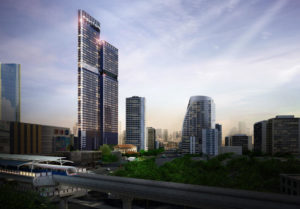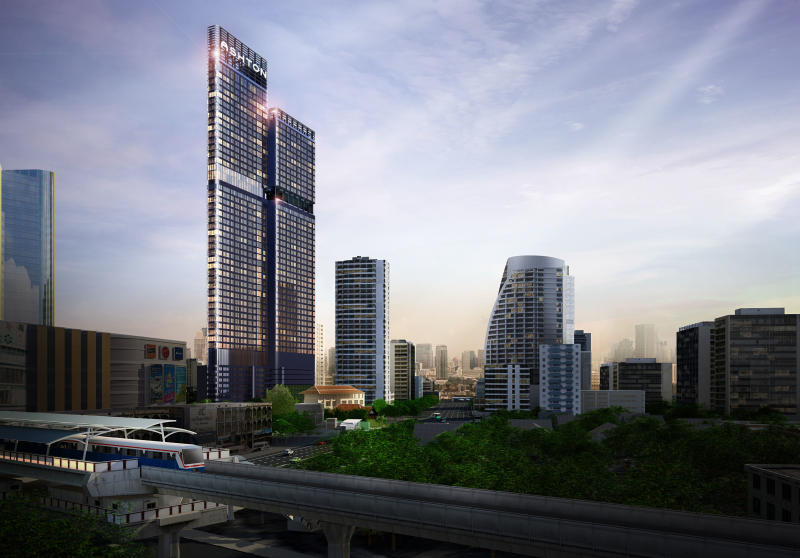
Chaos in the making? A look into Bangkok’s Ashton Condominium Asoke’s predicament and the revocation of its building permit
Article by John Mendiola of Silk Legal Co., Ltd
Thai media was set ablaze amid news of the Central Administrative Court’s (“CAC”) decision to revoke the building permit for Ananda Development Group’s Ashton Condominium Asoke, a THB 6.4 billion high-rise luxury condominium located in the heart of Bangkok’s central business district. Ambiguities surrounding the use of expropriated land, the liabilities of the parties involved, and the future of the residential development already housing tenants and co-owners, have generated considerable discussion among Thailand’s legal practitioners.
There is little doubt that the magnitude of this case will set a precedent for the use of expropriated land, and whether government entities are allowed to issue permits authorizing their use. While case studies exploring similar matters already exist, namely those involving New World Shopping Mall and Aetas Hotel Ruamrudee, the Ashton Condominium Asoke case is unique due to its circumstances and the number of stakeholders involved. Depending on future decisions made by the courts surrounding this case, there are considerable potential repercussions for the stakeholders involved; particularly for the developer and the co-owners who have already invested in the residential development.
Contextualizing the debacle
The main Plaintiff, in this case is the Stop Global Warming Association, alongside stakeholders from the community surrounding the development. The Plaintiffs filed an administrative lawsuit against five state officials and agencies, including the District Office Director of Wattana District, the Director of Public Works Department, the Head of the Bangkok Metropolitan Administration, the Governor of the Mass Rapid Transit Authority of Thailand, and the EIA Expert Committee. The case was filed on grounds that the defendants unlawfully permitted the construction of the development.
The basis for the claim comes from Section 2, Paragraph 2 of the Ministerial Regulation No. 33 (B.E. 2535) (1992), which stipulates that a high rise building with more than 30,000 square meters of total floor area must have a side road that is at least 12 meters in length connecting to a public road. This is defined by the Ministerial Regulation as a road that the public can enter or pass through with or without a fee. Ashton Condominium Asoke, with a total floor area of 55,348 square meters, is subject to this requirement. Though it appears to have complied accordingly, the CAC has ruled that the development’s 13-meter side road does not meet the Ministerial Regulation’s requirements, as it is considered an expropriated public road managed by the Mass Rapid Transit Authority of Thailand (“MRTA”).
The CAC further specified the MRTA holds no right to grant such usage of the road to Ashton Condominium Asoke. and the road can only be used to facilitate the MRTA’s mandate and provide a right of way to the public. Therefore, the disputed area does not qualify as a part of Ashton Condominium Asoke, meaning the development does not comply with the requirements set out under Ministerial Regulation No. 33. This also means the building permit granted for the construction of Ashton Condominium Asoke and other relevant permissions were given unlawfully by the agencies involved.
The question of damages and liabilities
While there are clear grounds for revoking the building permit, the issue of whether the Plaintiffs incurred damages from the erroneous acts committed by the Defendants remains in question. This is because the Plaintiffs, particularly the Stop Global Warming Association, played no direct role in the relationship between Ananda Development Group and the Defendants, particularly the MRTA. The CAC dismissed requests made by the Plaintiffs to revoke other permits held by Ashton Condominium Asoke, including the EIA approval and the permit given by the MRTA, under the premise that an unlawful administrative act does not necessarily call for having permits revoked if the act does not actively hurt a person. The Court also stated that other factors, including the intention to act in good faith, must also be taken into consideration.
Having said this, the primary point of contention at this stage of the case in determining whether any of the parties are liable for any damages caused by the issuance of the permit. Moreover, if it is determined that damages were caused, it must be established which stakeholder incurred the damages. This will largely depend on the developments of the case.
However, given that Ashton Condominium Asoke’s building permit was revoked, it is likely that Ananda Development Group will become a party to the case as an interpleader given the ramifications that would affect development investors. Depending on how the case develops, Ananda Development Group could either become a damaged party that was misled into believing they fulfilled all the requirements for obtaining the necessary permits; or a Defendant which may have to challenge possible allegations of misleading investors into investing in non-compliant real estate development. Yet, it is also possible that the developer will find itself in a situation where it is both a damaged party that fell victim to gross negligence committed by state officials, as well as an offender that did not exercise proper due diligence before soliciting investments from unwitting investors.
At this stage, Ananda Development Group’s role in the case remains to be seen.
The question of the use of expropriated land and regulatory compliance
Another point of interest is an opinion outlined under a resolution by Thailand’s Council of State and Cabinet, which declares state agencies that have already utilized expropriated land for their stated objectives are entitled to use the land for purposes they deem fit and effective for their mandate, even if such purposes differ from the original objectives. Based on current developments in this case, it appears that four building and construction permits have been revoked while two out of four permits were issued during the court proceedings, with no additional complaints or requests filed by the Plaintiffs. In a separate case, the Supreme Administrative Court (“SAC”) overruled a decision made by the CAC to revoke a building permit on grounds that it was an invalid proceeding, given that it was not raised by Plaintiffs during the initial filing of the complaint.
Given the precedent mentioned above, Ananda Development Group can appeal the decision made by the CAC, particularly if it can be proven that the MRTA issuing a permit to the developer remains consistent with the former’s mandate and does not hinder public use of the expropriated land. A move towards an appeal is also backed by Paragraph 2 under Section 70 of the Act on the Establishment of the Administrative Court and the Administrative Court Procedure Act B.E. 2542 (1999), which states that initial judgements will be suspended until the SAC finalizes its decision, or when the appeal period has lapsed.
It is also worth drawing comparisons to the cases involving New World Shopping Mall, which was ordered by the SAC to demolish building extensions that violated height restrictions. Also similar, the Aetas Hotel Ruamrudee fell short of the requirement of having a connecting road that is at least 12 meters in length. While it may appear the Ashton Condominium Asoke case bears similarities to the aforementioned, one can argue the residential development followed the requirements set out under the 1979 Building Control Act, by finding a way to connect the compound to Asoke-Montri Road; further showing good faith by undertaking the process for obtaining a permit from the MRTA. Moreover, Ashton Condominium Asoke claims to have addressed complaints from various stakeholders during the early stages of its development.
If an appeal is made against the CAC’s decision, the Defendants will have to prove the issuance of their respective permits was in line with the provisions set out in the resolution issued by Thailand’s Council of State and Cabinet. The Defendants will also have to demonstrate that Ananda Development Group, unlike New World Shopping Mall and Aetas Hotel Ruamrudee, followed all the requirements for acquiring the permits. If the Defendants successfully prove these points in court, it will mean that the initial lawsuit filed by the Plaintiffs holds no merit.
Concluding comments
As it currently stands, the case faces numerous ambiguities that will need to be addressed in court. If the Court ultimately decides the building permit was issued unlawfully, it will raise the question of who the affected parties are and how they will be compensated given their bona fide reliance on the continued existence of such an act, especially in the event where demolition is ordered.
As mentioned previously, the final judgement of this case will undoubtedly set a strong precedent for future cases of this nature. While the Court deals primarily with the legal aspect of this case, its decision will ultimately cause a ripple effect on Thailand’s real estate industry and may affect investor confidence. On the other hand, the SAC can rule in favour of the development by declaring that the disputed land can be considered part of the condominium complex. The decision remains to be seen.
However, as the Bangkok Metropolitan Administration, Department of Public Works, and Town Hall have moved towards issuing a bill that provides more flexible building requirements to address the number of cases involving road length, one can expect that the case will take a turn depending on the provisions of this upcoming bill.
Silk Legal
https://silklegal.com/
Silk Legal Co., Ltd is a boutique law firm that focuses on modern and upcoming legal trends in Thailand. We are a full-service corporate law firm with dedicated practice areas focused on startups, Corporate and M&A, regulatory matters, including Cannabis, as well as Banking and Fintech in Thailand. Our expert knowledge of Thailand’s regulatory climate and handling of commercial matters, means we are fully equipped to help you navigate both the present and future challenges being faced by your business.
We leverage our multi-national team to provide you with an international perspective of Thai law issues. Our approach is to fully explore your issues and offer you a global perspective, tailored to our local environment. We empower you with a diverse range of ideas, tools and technology to make your lives, and that of your enterprise or startup, much easier.
Source: https://www.lexology.com
